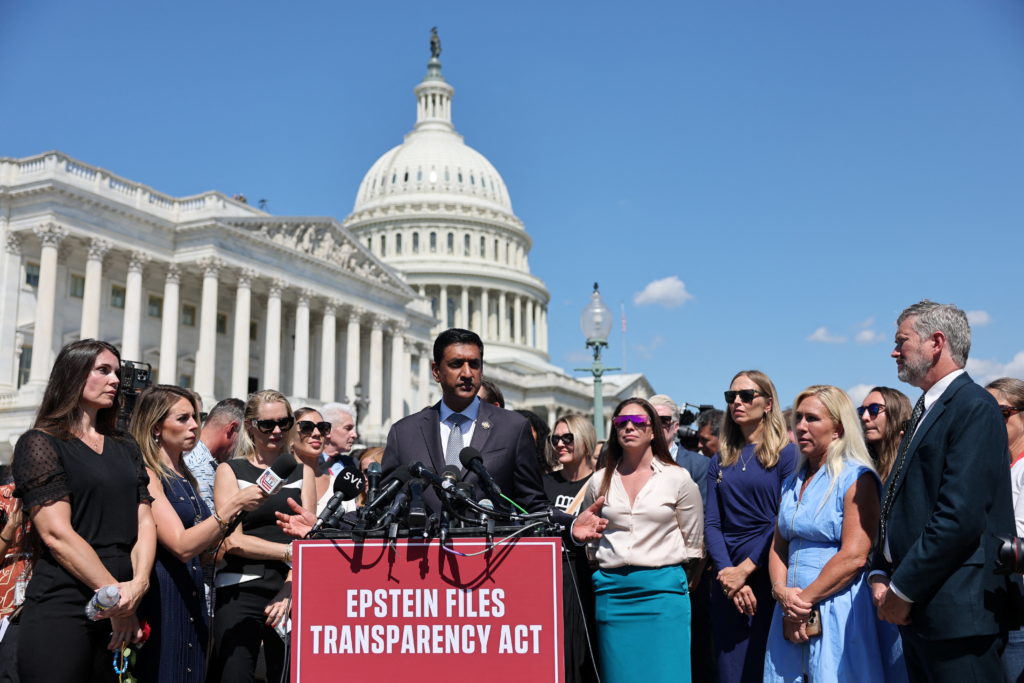WASHINGTON D.C. – After a months-long political battle that pitted congressional bipartisanship against White House resistance, the U.S. Congress has overwhelmingly passed legislation to compel the Justice Department to release all investigative files related to the late convicted sex offender Jeffrey Epstein. The Epstein Files Transparency Act sailed through the House and Senate this week, delivering a significant victory to survivors and their advocates who have long demanded full accountability.
Legislative Breakthrough: A Bipartisan Coalition
In a rare show of unity, the House passed the bill by a near-unanimous vote of 427-1, followed swiftly by Senate approval through unanimous consent. This sudden legislative momentum comes after months of Republican leadership blocking the measure.
The Catalyst: The bill was pushed to the floor after a handful of dissident Republicans joined all House Democrats to sign a discharge petition, forcing a vote over the objections of the House Speaker.
The Reversal: President Donald Trump, who had previously dismissed the scandal as a “Democrat hoax” and resisted the full release, unexpectedly reversed his stance over the weekend. He instructed Republicans to support the bill, stating, “We have nothing to hide.” This shift paved the way for the overwhelming vote.
Survivor-Led Push: The vote follows intense lobbying from Epstein abuse survivors, who rallied on Capitol Hill, recounting their experiences and demanding transparency. The bill allows for the necessary redactions to protect victims’ identities and information related to ongoing federal investigations, but explicitly prohibits withholding material merely due to “embarrassment, reputational harm, or political sensitivity.”
New Revelations Stoke Political Tensions
The legislative push was fueled by recent document releases, most notably a trove of emails from Epstein’s estate, made public by the House Oversight Committee. These emails have reignited the controversy surrounding Epstein’s connections to powerful figures across the political and social spectrum.
Trump Allegations: Newly disclosed emails included a correspondence where Epstein suggested President Trump “knew about the girls.” This directly contradicts the President’s long-standing public denials of having any knowledge of Epstein’s illegal activities, though the White House has dismissed the emails as selectively leaked smears without proof of wrongdoing.
Other Key Names: The wider body of documents known as the “Epstein files” includes flight logs and contacts that have previously named high-profile figures such as former President Bill Clinton, Prince Andrew, and others. The inclusion of names does not constitute an accusation of criminal activity, but it illustrates the financier’s vast network of influential friends. Prince Andrew has already been stripped of his royal titles due to his relationship with Epstein.
The Black Book: The files also encompass Epstein’s extensive contact lists, sometimes referred to as his “black book,” which has long been the subject of speculation regarding a client list for his sex trafficking ring. While the Department of Justice previously stated no credible evidence of a blackmail list was found, the public remains focused on the full scope of Epstein’s alleged enablers.
What Happens Next?
The Epstein Files Transparency Act now heads to President Trump’s desk, where he is expected to sign it, fulfilling his recent pledge. The legislation gives the Justice Department a 30-day deadline to make the files public.
The looming question is how the Justice Department, led by Attorney General Pam Bondi, will handle the massive volume of material—over 300 gigabytes of data and physical evidence—and what level of redaction will be applied to protect victims and ongoing cases. Survivors and lawmakers alike are determined to ensure that transparency is not undercut by overly broad claims of legal privilege or political self-interest.
For the victims, this moment represents a long-overdue step toward justice and a chance to finally force a national reckoning with how a wealthy and powerful figure like Jeffrey Epstein was able to evade serious consequences for years.
